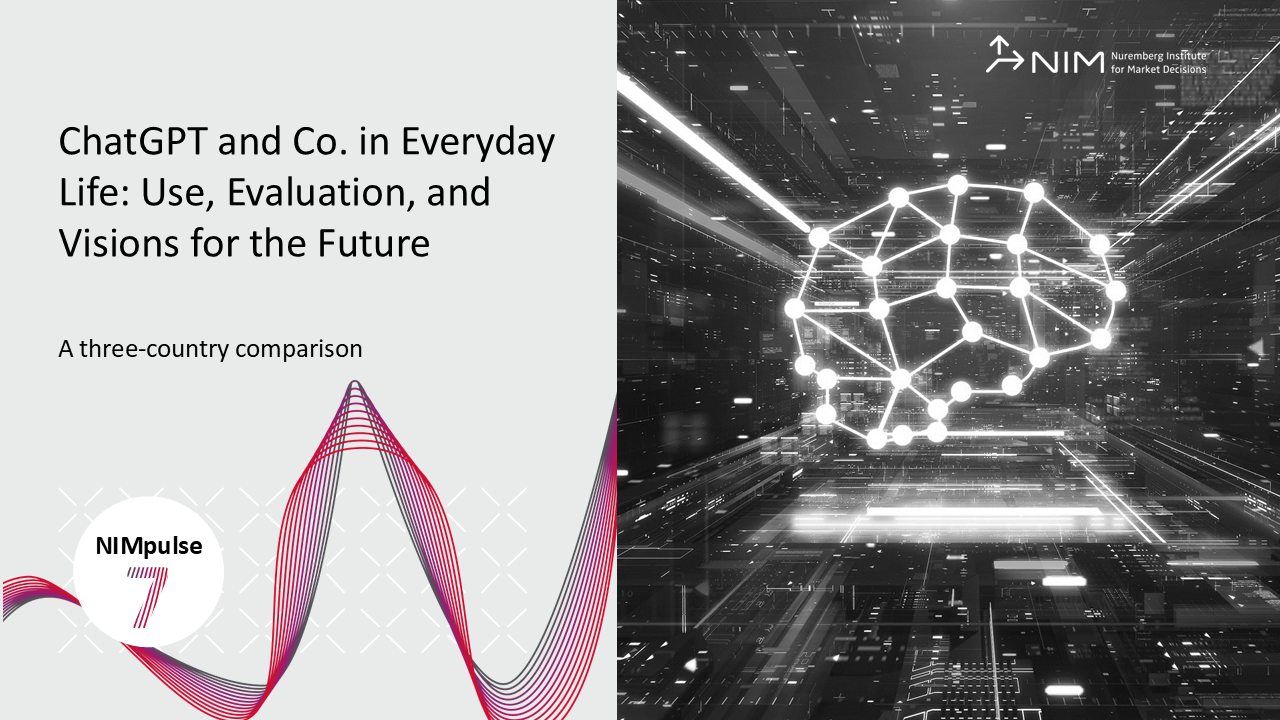Publications
ChatGPT and Co. in Everyday Life: Use, Evaluation, and Visions for the Future. A three-country comparison (NIMpulse 7)
DownloadKaiser, C., Buder, F., & Biró, T. (2024). ChatGPT and Co. in Everyday Life: Use, Evaluation, and Visions for the Future. A three-country comparison. NIMpulse 7.
2024
Dr. Fabian Buder,
Tobias Biró
ChatGPT and Co. in Everyday Life: Use, Evaluation, and Visions for the Future
With the release of the chatbot ChatGPT in November 2022, the topic of artificial intelligence seems to have found a permanent place among broader public discourse. While the technology is being celebrated as a helpful innovation for many areas of research and business, its establishment in society is also giving rise to ethical and copyright concerns.
Aside from such fundamental discussions, ChatGPT in particular is already being used by large sections of the population. The tool uses AI to interpret human speech and generate a response. A wide range of possible applications are conceivable. But for what specific purposes are users in the US, Germany, and the UK currently using it? How satisfied are they with it? And where do they see further areas of application?
NIM analyzes similarities and differences in a three-country comparison. How do the nations view shopping, everyday life, and a future with ChatGPT and co.?
Key Insights:
ChatGPT users tend to be young, with a high level of education and a high income.
Use and evaluation of ChatGPT: Private use predominates in the countries surveyed. Germans tend to rate the tool more critically than Brits and Americans. The latter use it more diversely.
Shopping with ChatGPT: The vast majority see great GenAI potential. In the United States, the majority of users even believe that the tools are at least as credible as human experts when it comes to product recommendations.
Everyday life with ChatGPT: The information provided by the tool is generally highly trusted by users. They see a wide range of potential applications in everyday life, such as organizing and checking news and knowledge.
Future with AI: A rather pessimistic view of the future dominates in all three countries. One major concern is the loss of jobs due to AI. It is therefore not surprising that a majority would like to see stronger regulation.
The typical ChatGPT user
At least 60 % of the population in all three countries have heard of ChatGPT. Of these people, around half also use the chatbot. In Germany, this means that around 30 % of the total population describe themselves as users. There are clear differences between Germany and the other two countries, particularly in the use of the paid version of ChatGPT: While only 17 % of German users pay for the application, the figure is 24 % in the United Kingdom and 29 % in the United States.
Interesting are the differences between the countries in detail. While roughly the same number of men and women have used ChatGPT in the UK and the US, there is a large gap in Germany. And while usage in Germany is also heavily dependent on educational attainment, there are no differences in this respect in the US. However, the gap between income groups is widest in the US. If generative AI (GenAI) really does contribute to higher productivity, policymakers would be well advised to keep an eye on these differences and take countermeasures.
Use and evaluation of ChatGPT
Around 60 % of all ChatGPT users in Germany, the United Kingdom, and the United States currently use the chatbot primarily for private purposes. In Germany, the proportion of users who state that they use the tool primarily for business purposes is highest at 23 %. In the United Kingdom and the United States, however, there are significantly more people who report using ChatGPT both privately and professionally.
In Germany, users currently use the chatbot mainly in the area of text work, which can almost be described as classic. In the UK and even more so in the US, users are already using ChatGPT in a more diverse way. Here, many are already using the tool as an alternative to a search engine (33 % and 35 %, respectively), for entertainment and amusement, and for generating ideas. The utilization for education and training is also more widespread here (26 % and 27 %, respectively) than in Germany (17 %).
ChatGPT users in Germany agree with critical statements about how the tool works much more often than those in the UK and the US. For example, they are more often of the opinion that the chatbot is more of a gimmick and is not (yet) fully developed. American and British users are more positive: They are more likely than German users to think that ChatGPT increases the quality of decisions. There is, however, a slight deviation: More users in Germany no longer want to do without the tool (13 % vs. 7 % in the UK and 9 % in the US, respectively).
Future use potential is conceivable for many respondents, particularly in the area of text work. Many respondents can also imagine using ChatGPT in the future as an assistant, for education and training, and as a partner in generating new ideas. Respondents from the UK and the US can imagine significantly more types of future use. The gap is particularly large for activities such as "gaining new ideas for creative tasks" and "finding solutions to problems in everyday life."
What is clear is that people in Germany not only use the tool less frequently. Those who do use it also use it less frequently than people in English-speaking countries, and they tend to rate ChatGPT more critically on average. Whether this is due to the linguistic capabilities of the tool or for other reasons cannot be answered here.
In any case, it is exciting to see how many functions the AI already fulfills, especially for users in the US and the UK. One in three people there use ChatGPT as an alternative to a search engine, for example. Do Google and co. have to fear for their business model?
Shopping with ChatGPT
In general, people from the US are most likely to consider using ChatGPT when purchasing products (share: 80 %). But the majority of people in the UK (73 %) and Germany (60 %) are also interested in such functions. However, 41 % of Germans also state that they do not want to use any of the applications available for selection in a shopping context. In the UK (27 %) and the US (20 %), this proportion is significantly lower.
In what specific ways would consumers like to use ChatGPT when buying products? A relative majority of respondents could well imagine using it to compare products and research prices. Support when screening products and user reviews was also mentioned frequently. The types of use with the fewest mentions include "source of information about investment opportunities" and "receiving specific purchase recommendations".
In Germany and the United Kingdom in particular, a majority find a human expert in a shopping context more credible than an intelligent chatbot like ChatGPT. However, the lead for human experts in the UK is relatively small. After all, 36 % have a higher or equal level of trust in ChatGPT here. In the United States, a majority of 42 % believe that ChatGPT is more credible or just as credible as a human.
In general, the chances are therefore not bad that a new shopping gatekeeper will emerge from ChatGPT or another GenAI tool. Companies should promptly think about how they can make their sales not only search engine optimized, but also GenAI optimized.
Everyday life with ChatGPT
General trust is somewhat stronger or weaker depending on the country. While around 65 % of chatbot users in Germany trust its information, the figure is almost 80 % in the United Kingdom and the United States. Conversely, around one in three users in Germany does not trust the answers, information, and suggestions provided by ChatGPT, compared to 18 % in both the UK and the US.
A clear majority of the respondents in all three countries surveyed can imagine using the tool for (further) everyday purposes. Four out of five ChatGPT users surveyed in the United States are open to using the tool for everyday purposes that may not have been considered before. In the UK (69 %) and Germany (62 %), the proportion is only slightly lower.
When asked about specific everyday uses, most respondents mentioned the ability to check information and news with the chatbot. Similarly popular is summarizing and processing news and scientific findings. Respondents are therefore most likely to see the tool as a helper in the task of organizing and checking news and knowledge. Concrete recommendations, such as on careers or political elections, are less frequently expected.
This finding also suggests that organizations–as well as actors in politics and science–should reflect intensively on ChatGPT. Current users of the tool, and especially those in the analyzed English-speaking countries, have a high level of trust in the content generated–despite the hallucination problem. With ChatGPT and other GenAI tools, potential new gatekeepers are also emerging in the information sector that can exert influence on politics and business. Publishers and news agencies will have to consider how they can coexist with these tools.
Future with AI
Respondents in all three countries are rather pessimistic about the future. One major concern is that jobs will be lost due to AI. This concern is shared by around one in two respondents across all three countries, although people in the US and UK are slightly more divided overall than in Germany, where a higher proportion of people have no opinion. A large proportion of respondents also believe that creativity and knowledge will be lost due to AI. As far as the objectivity of AI is concerned, the majority in all three countries still have no clear opinion. The Germans are somewhat more pessimistic than the British and Americans.
A labeling requirement for content created by AI is particularly popular in Germany. One in two would like to see this, and many respondents in the UK and the US would also find this useful. The obligation to disclose partnerships between AI and brands or manufacturers also received comparatively high approval. American respondents were the most vocal in calling for politics to stay out of the further development of AI, but there, too, this attitude is only held by a minority (28 %).
Although more people in the United Kingdom and the United States currently use GenAI, and although these people report a high level of satisfaction, they hardly differ from respondents in Germany in their pessimistic future expectations regarding AI.
Perhaps respondents differentiate between AI and ChatGPT. Or perhaps they are encouraged by the performance of current GenAI tools in their concerns about unemployment. In any case, the desire for more regulation is clear, and it is very likely that not only the technological but also the regulatory environment will change in the near future.
Authors
- Dr. Carolin Kaiser, Head of Artificial Intelligence, NIM, carolin.kaiser@nim.org
- Dr. Fabian Buder, Head of Future & Trends, NIM, fabian.buder@nim.org
- Tobias Biró, Research Communication Manager, NIM, tobias.biro@nim.org
Contact

